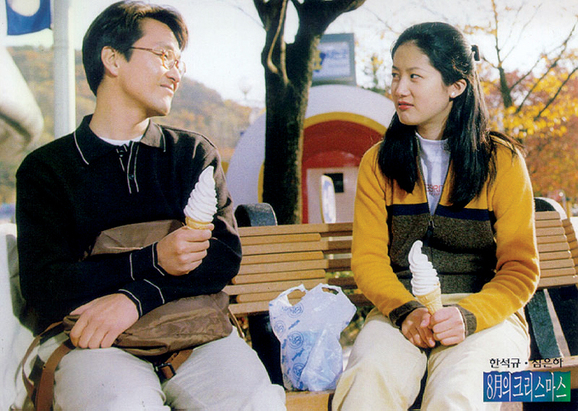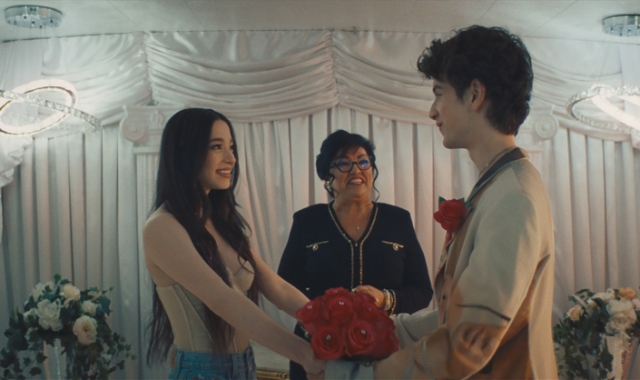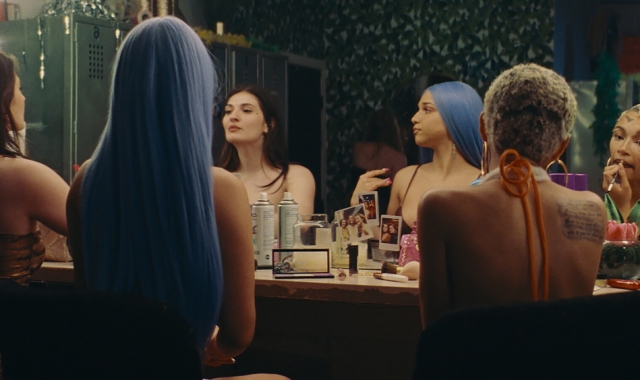
인터뷰할 때 자주 나오는 질문이다. “한국영화 특유의 독특한 특징이 뭔가?” 다른 아시아영화들하고 어떻게 다른가? 성실하게 답변하기 거의 불가능한 질문이다. 한국영화는 너무나도 다양하고 한국 감독들이 받는 영향들도 워낙 폭이 넓어서 답변을 하면 상투적이고 엄청나게 단순화된 것처럼 들린다. 그렇지만 한국영화들이 낭만적인 관계를 그리는 방법에 어딘가 재미있고 예사스럽지 않은 데가 있다는 것을 느낀 지 오래됐다. 아래는 그 느낌을 표현하려는 서툰 시도다.
외부인의 관점에서 한국영화에서 남녀관계를 다룬 영화들의 가장 두드러진 측면은 “순수/타락”의 이분법이다. 가장 순수한 사랑 이야기서부터 가장 추악한 욕정과 집착의 이야기를 거치는 스펙트럼을 상상하라. 세계적으로, 특히 할리우드에서, 대부분의 영화 러브 스토리들은 중도를 지킨다. 젊은 남녀가 만나 데이트를 하고, 어떤 때는 함께 잠자리에 들기도 한다. 섹슈얼리티에 대해 솔직한 것은 영화에 사실주의를 한 겹 더해준다. 마이크 니콜스의 <클로저> 같은 영화는 중간지대를 지키려고 온갖 노력을 다한다. 쥬드 로의 인물이 사랑에 패배자가 되는 것은 그가 사람들이 순수와 타락의 혼합이라는 것을 받아들이지 못하기 때문이다.
한국영화는 위에서 말한 스펙트럼의 양쪽에서 마찬가지로 너무나도 효과적이고 편안하게 지낸다는 것 때문에 예사스럽지 않다. 리얼리즘을 포괄하면서도 <8월의 크리스마스>는 남녀 주인공 사이의 피어나는 사랑을 거의 영묘한 것으로 그려낸다. 말로 표현하기 조차 너무 섬세한 것으로 말이다. <엽기적인 그녀>는 콘돔과 여관 농담들을 즐길 지 모르지만, 결정적으로 영화는 견우와 엽기녀 사이의 키스를 스크린상으로 보여주기를 꺼려할 정도로 소심하다. (그들이 섹스를 한다는 것은 더더욱 상상할 수 없는 일이다.)
나머지 한쪽 극단에 <거짓말>이나 <욕망>과 같은 영화들은 할리우드가 용기 없어 가지 못하는 곳에 가상 투어를 시켜준다. 이창동 감독이 <오아시스>를 찍는 동안 그 영화를 “세상에서 가장 추악한 멜로”라 말을 했고, 박진표 감독의 <죽어도 좋아>는 우리가 갖고 있는 낭만에 대한 선입견을 파괴하려 나선다. 한편 김기덕 감독이 처음 유럽에 있는 팬 군단을 끌어오기 시작한 것은 <섬>이나 <나쁜 남자>와 같이 비뚤어진 사랑 이야기를 갖고서다. 국제 관객에게 두 종류의 로맨스 – 순수한 것과 타락한 것이 다 신선하고 새롭게 느껴진다.
순수/타락 이분법은 핵심적으로 사회의 맥락 속에서 토론되는 도덕적인 이슈다. 로맨스의 이런 측면을 다룬 할리우드 영화들에 상상력이 결여된 이유 중에 하나가 이것이 다소 해결이 된 문제로 간주되기 때문일 지도 모른다. 미국인들은 그저 자신이 보수인지 진보인지만 결정하면 되고, 그 후 사회가 받아들일 수 있는 행동 방식에 대해 매우 명백한 가이드라인을 제공한다. 젊은 커플들이 대면하는 도덕적 이슈들을 향한 사회적 태도는 지난 30년 간 별로 변한 것이 없다.
대조적으로 젊은 한국인들이 대면하는 도덕적 지형은 훨씬 더 복잡한 것 같다. 나이가 많고 적은 한국인 세대 간의 차이는 다른 나라에서 보다 더 크지만, 강한 가족 관계 때문에 부모의 압력을 무시하는 일이 더 힘들다. 보다 젊은 세대들이 도덕성과 성별에 대해 갖는 의식은 진화되고 있으며 다른데, 더욱이 많은 젊은 한국인들은 외국에서 공부를 하면서 또 다른 도덕적 가치의 종류에 노출되기도 한다. 이렇게 많은 신호들이 엇갈리는데 젊은 커플들이 서로에게 어떻게 행동해야 할 지 알기란 힘들 것이다.
한국 사회에 널리 퍼진 복잡한 도덕적 이슈들에 긍정적인 측면이 있다면, 로맨스를 탐구하는 영화인들이 다룰 수 있는 소재가 더 재미있다는 것이다. 필자가 생각할 수 있는 그 어떤 국가 영화 보다 한국영화가 로맨스와 남녀관계를 훨씬 더 심각하게 받아들이는 것 같다. 이 일은 한국에 국한된 것은 아닐 수도 있지만, 한국 러브 스토리들에 대부분 현대 할리우드 영화 속에선 부족한 에너지를 제공하기도 한다.
Why I like Korean love stories
The question often comes up in interviews: what is a unique, distinguishing characteristic of Korean films? What makes them different from other movies in Asia? It's an almost impossible question to answer in good faith -- Korean cinema is so diverse, and the influences that shape Korean directors are so broad, that any answer comes off as a banal oversimplification. However I've long sensed something interesting or unusual in the way Korean films depict romantic relationships. The following is a crude attempt to articulate that feeling.
From an outsider's point of view, one of the most striking aspects of Korean relationship films is the "pure/dirty" dichotomy. Imagine a spectrum ranging from the purest of love stories to the most vile tale of lust and obsession. Worldwide, and especially in Hollywood, most onscreen love stories stick to the middle. Young couples meet, date, and sometimes go to bed together. Being frank about sexuality gives films an added layer of realism. A film like Mike Nichols' Closer goes out of its way to occupy the middle ground: Jude Law's character is a failure in love because he can't accept that people are a mixture of the pure and the dirty.
Korean cinema is unusual in being so effective, and so comfortable, at both ends of the spectrum. While embracing realism, Christmas in August presents the developing love between its two leads as something almost ethereal: too delicate to even be spoken of in words. My Sassy Girl may revel in condom and yogwan jokes, but ultimately the film is too shy to even allow Gyeon-woo and The Girl an onscreen kiss. (You can't even imagine them having sex) At the other extreme, films like Lies or Desire take us on a virtual tour of places that Hollywood lacks the courage to visit. Lee Chang-dong, while shooting Oasis, referred to it as "the world's most vile melodrama," * while Park Jin-pyo's Too Young To Die sets out to destroy our preconceived notions of romance. Kim Ki-duk, meanwhile, first won over his legions of fans in Europe with the tortured, twisted love stories in The Isle and Bad Guy. For international viewers, both types of romance – pure and gritty – come across as fresh and new.
At its heart, the pure/dirty dichotomy is a moral issue, debated over in the context of society. Perhaps one reason why Hollywood films about this aspect of romance lack imagination is because it is seen as more or less a solved issue. Americans need only decide whether they are conservative or liberal, and then society provides very clear guidelines about acceptable modes of behavior. Society's attitudes towards the moral issues faced by young couples haven't changed much in the past 30 years.
In contrast, the moral landscape that young Koreans face seems much more complicated. The generation gap between older and younger Koreans is much wider than in most countries, yet strong family ties make it harder to ignore parental pressure. Younger generations have a different, evolving sense of morality and gender, and on top of this many young Koreans study abroad, exposing them to yet another set of moral values. So many mixed signals must make it difficult for young couples in love to know how to act towards each other.
If there's a silver lining to the complex moral issues that pervade Korean society, it's that filmmakers exploring romance have more interesting material to work with. These days, Korean cinema seems to take the issue of romance and relationships much more seriously than any other national cinema I can think of. This may not be unique to Korea, but it does provide Korean love stories with an energy that is lacking in most contemporary Hollywood films.






